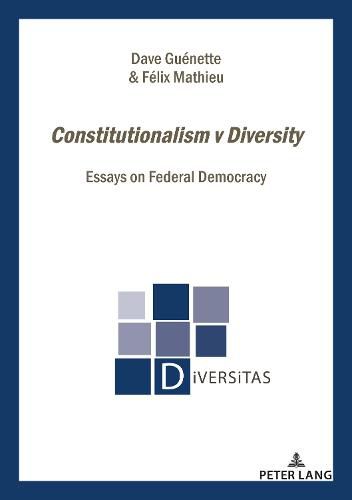Readings Newsletter
Become a Readings Member to make your shopping experience even easier.
Sign in or sign up for free!
You’re not far away from qualifying for FREE standard shipping within Australia
You’ve qualified for FREE standard shipping within Australia
The cart is loading…






This title is printed to order. This book may have been self-published. If so, we cannot guarantee the quality of the content. In the main most books will have gone through the editing process however some may not. We therefore suggest that you be aware of this before ordering this book. If in doubt check either the author or publisher’s details as we are unable to accept any returns unless they are faulty. Please contact us if you have any questions.
This book provides an in-depth analysis of how constitutionalism and diversity can be friends and foes alike in contemporary multinational democracies. By focusing mainly on the dynamics between Quebec and Canada and comparing these with ongoing issues in Catalonia and Spain, Flanders and Belgium, and South Tyrol and Italy, the authors offer new insights into the public management of national diversity. In doing so, they sought to unpack the numerous challenges divided societies are facing.
The pieces that together form the title of this book are not merely of symbolic significance. Constitutionalism v Diversity: Essays on Federal Democracy echoes the four underlying principles of the Canadian Constitution that the Supreme Court of Canada identified in its famous 1998?Reference re Secession of Quebec. These are (1) federalism, (2) democracy, (3) constitutionalism and the rule of law, and (4) protection of minorities. While these four concepts are at the very core of both authors' argument and approach, the Supreme Court of Canada's Secession Reference is guiding them through the book by providing a robust and meaningful theoretical and analytical framework.
These principles appear as universal normative parameters societies should see as ideals to pursue and translate - while adapting their content to the specific context - into concrete institutions and practices. Even more today this book shows the great analytical value of these four principles to critically appraise of the way multinational liberal democracies in general and federal systems in particular are evolving.
$9.00 standard shipping within Australia
FREE standard shipping within Australia for orders over $100.00
Express & International shipping calculated at checkout
This title is printed to order. This book may have been self-published. If so, we cannot guarantee the quality of the content. In the main most books will have gone through the editing process however some may not. We therefore suggest that you be aware of this before ordering this book. If in doubt check either the author or publisher’s details as we are unable to accept any returns unless they are faulty. Please contact us if you have any questions.
This book provides an in-depth analysis of how constitutionalism and diversity can be friends and foes alike in contemporary multinational democracies. By focusing mainly on the dynamics between Quebec and Canada and comparing these with ongoing issues in Catalonia and Spain, Flanders and Belgium, and South Tyrol and Italy, the authors offer new insights into the public management of national diversity. In doing so, they sought to unpack the numerous challenges divided societies are facing.
The pieces that together form the title of this book are not merely of symbolic significance. Constitutionalism v Diversity: Essays on Federal Democracy echoes the four underlying principles of the Canadian Constitution that the Supreme Court of Canada identified in its famous 1998?Reference re Secession of Quebec. These are (1) federalism, (2) democracy, (3) constitutionalism and the rule of law, and (4) protection of minorities. While these four concepts are at the very core of both authors' argument and approach, the Supreme Court of Canada's Secession Reference is guiding them through the book by providing a robust and meaningful theoretical and analytical framework.
These principles appear as universal normative parameters societies should see as ideals to pursue and translate - while adapting their content to the specific context - into concrete institutions and practices. Even more today this book shows the great analytical value of these four principles to critically appraise of the way multinational liberal democracies in general and federal systems in particular are evolving.